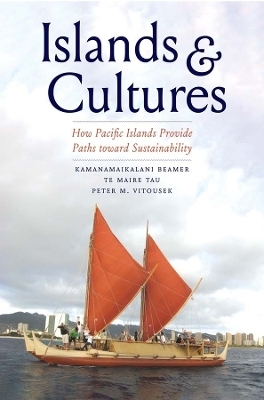
Islands and Cultures
How Pacific Islands Provide Paths toward Sustainability
Seiten
2023
Yale University Press (Verlag)
978-0-300-25301-6 (ISBN)
Yale University Press (Verlag)
978-0-300-25301-6 (ISBN)
A uniquely collaborative analysis of human adaptation to the Polynesian islands, told through oral histories, biophysical evidence, and historical records
Humans began to settle the area we know as Polynesia between 3,000 and 800 years ago, bringing with them material culture, including plants and animals, and ideas about societal organization, and then adapting to the specific biophysical features of the islands they discovered. The authors of this book analyze the formation of their human-environment systems using oral histories, biophysical evidence, and historical records, arguing that the Polynesian islands can serve as useful models for how human societies in general interact with their environments.
The islands’ clearly defined (and relatively isolated) environments, comparatively recent discovery by humans, and innovative and dynamic societies allow for insights not available when studying other cultures. Kamana Beamer, Te Maire Tau, and Peter Vitousek have collaborated with a dozen other scholars, many of them Polynesian, to show how these cultures adapted to novel environments in the past and how we can draw insights for global sustainability today.
Humans began to settle the area we know as Polynesia between 3,000 and 800 years ago, bringing with them material culture, including plants and animals, and ideas about societal organization, and then adapting to the specific biophysical features of the islands they discovered. The authors of this book analyze the formation of their human-environment systems using oral histories, biophysical evidence, and historical records, arguing that the Polynesian islands can serve as useful models for how human societies in general interact with their environments.
The islands’ clearly defined (and relatively isolated) environments, comparatively recent discovery by humans, and innovative and dynamic societies allow for insights not available when studying other cultures. Kamana Beamer, Te Maire Tau, and Peter Vitousek have collaborated with a dozen other scholars, many of them Polynesian, to show how these cultures adapted to novel environments in the past and how we can draw insights for global sustainability today.
Kamanamaikalani Beamer is professor and Dana Naone Hall Endowed Chair, University of Hawai‘i at Mānoa. Te Maire Tau is associate professor and director, Ngāi Tahu Studies Centre at Canterbury University in New Zealand. Peter M. Vitousek is professor of biology, Clifford G. Morrison Professor of Population and Resource Studies, and a senior fellow in the Woods Institute for the Environment at Stanford University.
| Erscheinungsdatum | 22.12.2022 |
|---|---|
| Zusatzinfo | 14 b-w illus. |
| Sprache | englisch |
| Maße | 140 x 216 mm |
| Themenwelt | Geisteswissenschaften ► Archäologie |
| Geisteswissenschaften ► Geschichte ► Regional- / Ländergeschichte | |
| Geisteswissenschaften ► Geschichte ► Teilgebiete der Geschichte | |
| Sozialwissenschaften ► Ethnologie | |
| Sozialwissenschaften ► Soziologie | |
| ISBN-10 | 0-300-25301-X / 030025301X |
| ISBN-13 | 978-0-300-25301-6 / 9780300253016 |
| Zustand | Neuware |
| Informationen gemäß Produktsicherheitsverordnung (GPSR) | |
| Haben Sie eine Frage zum Produkt? |
Mehr entdecken
aus dem Bereich
aus dem Bereich
Erinnerungen
Buch | Softcover (2024)
Pantheon (Verlag)
16,00 €


